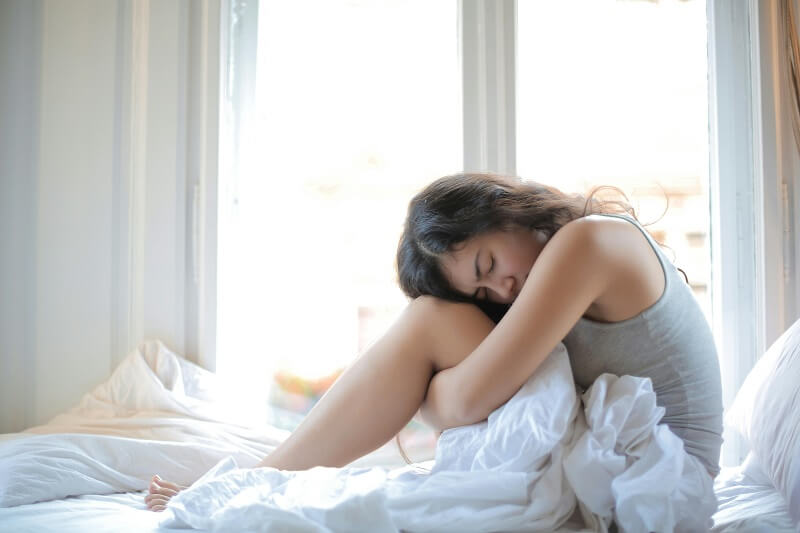Hot flashes cause women to feel warm from the inside out, the skin becomes red and blotchy, and there is an accelerated heartbeat. During the menopausal transition, some women experience moderate hot flashes, but for others, they become refractory and uncomfortable.
Even though there is no conclusive evidence linking hot flashes to estrogen fluctuations, researchers believe this to be the primary cause. Hormone replacement therapy (HRT) has been prescribed as a solution for menopausal hot flashes, but HRT is associated with serious side effects. Consequently, many women seek non-hormonal remedies for hot flashes. Let’s take a look at some of them.
Symptoms of Hot Flashes:
Hot flashes have distinct symptoms, so knowing them helps manage this common issue during menopause. Look out for these signs:
- Sudden Onset of Warmth and Flushed Appearance: A noticeable warmth may abruptly envelop your chest, neck, and face, accompanied by a flushed, reddish complexion. This sudden onset of heat and flushed appearance is a distinctive characteristic.
- Fast Heartbeat and Sweating: You may sense your heart beating faster when a heat surge occurs. You may sweat primarily on your upper body, increasing the warmth sensation.
- Chilled Feeling and Anxiety: A sudden wave of intense warmth sweeps over you, followed by an eerie chill. Anxiety may grip you as these sensations ebb and flow, leaving you feeling uneasy and unsettled.
- Frequency and Intensity: Hot flashes can strike at any time, day or night, causing discomfort that ranges from mild to intense. These episodes may last mere seconds or linger for several minutes. Some women experience frequent hot flashes, while others have them intermittently. Night sweats are a common manifestation, disrupting sleep patterns and quality of rest.
- Interfering with Daily Routine for Longer Time: Hot flashes can range from mild discomfort to severe episodes, often interrupting daily routines and activities. These occurrences are not fleeting; most women experience frequent hot flashes daily. Such sensations can persist for extended periods, with some individuals enduring them for over seven years and others experiencing them for more than a decade.
Diagnosing Hot Flashes
Generally, your healthcare provider can recognize hot flashes by listening to the symptoms you describe. They might also suggest blood tests to evaluate your hormone levels and confirm if you’re transitioning through menopause.
Treating Hot Flashes
Coping with hot flashes frequently involves estrogen therapy, even though it carries potential hazards. Alternatively, certain medications, such as antidepressants or anticonvulsants, may provide relief, though less effectively. It’s important to consult your physician regarding treatment options. If hot flashes are tolerable, treatment may not be necessary as they tend to subside over time. Lifestyle modifications can also help lessen symptoms.
Lifestyle Changes
Mild hot flashes are tolerable, but persistent ones can become a headache. One of the safest ways to prevent hot flashes is by making simple lifestyle changes, including:
- Quitting smoking
- Exercise & maintain a healthy weight
- Lowering the room temperature
- Drinking cold water before going to bed
- Wearing comfortable clothing
Feeling hot flashes? Before considering medications, try these simple lifestyle changes:
- Keep a portable fan nearby to get some cooling relief when the heat hits.
- Consider trying relaxation practices like yoga or meditation to manage hot flashes.
- Mood swings and anxiety? Deep breathing, yoga, or meditation may help calm your mind.
- Find hobbies that make you feel accomplished and boost your well-being.
- Lean on your loved ones and let friends and family provide support.
- Unwind before bed with a warm bath or shower for better sleep.
- Engage in daily physical activity to improve your sleep patterns naturally.
- Avoid relying too much on sleeping pills, as they can disrupt your natural sleep cycle.
- If hot flashes become overwhelming or persist, consult your healthcare provider.
Your Diet Matters
Non-hormonal remedies for hot flashes include changing one’s diet. The fact is that what we eat has a significant impact on the metabolic processes in our bodies. For example, spicy foods or coffee can heat the body. Have a refreshing salad instead!
Caffeine also has a similar effect. Decaffeinated coffee is a good alternative. Also, alcoholic beverages can trigger hot flashes, so women should adjust their drinking habits.
KÜLKUF Wristbands
If you’re looking for a quick and effective solution to eliminating irritating hot flashes, a KÜLKUF wristband is the right answer. This product can help you cool down quickly and without any hassle.
The KÜLKUF wristband utilizes advanced technology to regulate your body temperature, providing instant relief from the stifling heat and restoring your comfort. No more fanning yourself or drenching in sweat. With a simple button press, instantly feel a soothing cooling for hot flashes. Regain restful sleep and relief, taking command over menopausal symptoms that disrupt your comfort and slumber.









